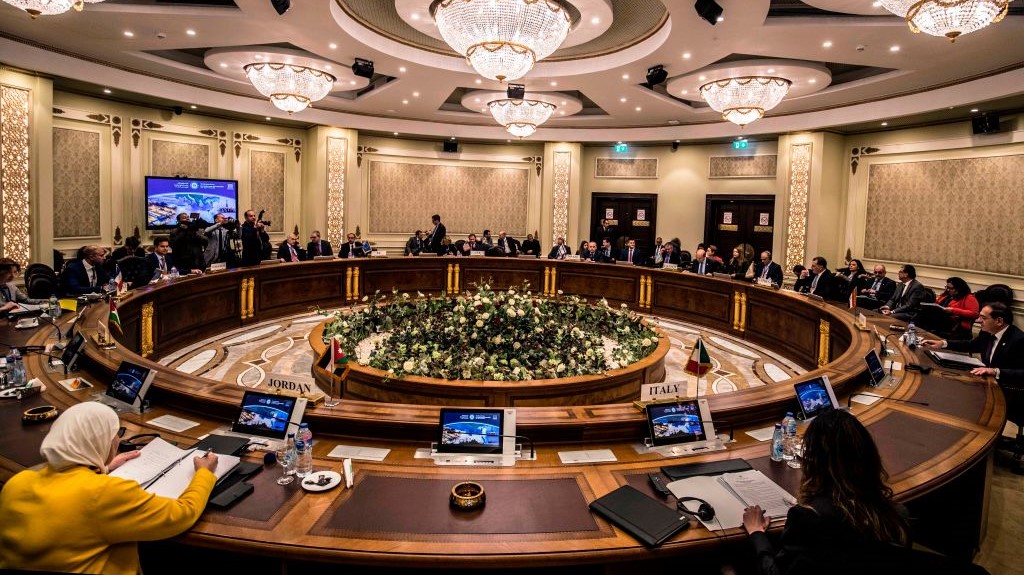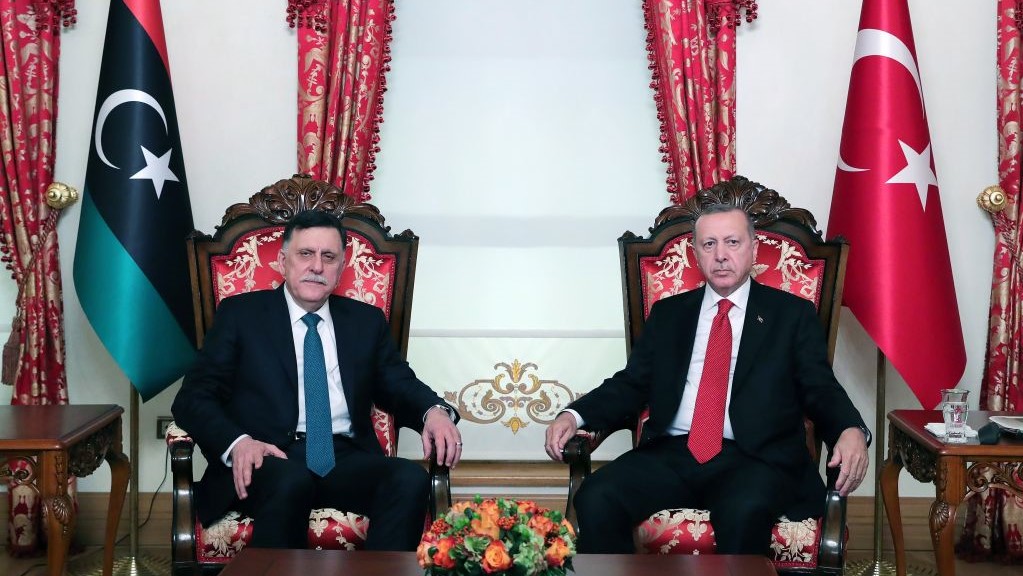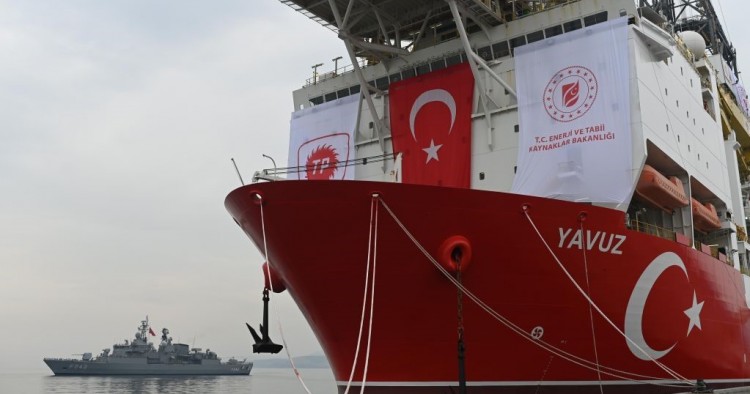The eastern Mediterranean has become an increasingly important focus for Turkey's foreign and security policy, but the interlocking of new issues like energy politics and sovereignty rights with old problems like Cyprus has created significant challenges for Ankara.
The exploration and discovery of offshore natural gas resources over the past decade by the eastern Mediterranean littoral states of Israel, the Republic of Cyprus, and Egypt has brought two issues to the forefront: First, the need to delineate maritime boundaries, a step these states had avoided taking in the past so as not to infringe on fishing activity; and second, the need to transport the gas extracted from these new fields to end-users in Europe via pipelines and/or liquefied natural gas (LNG) facilities. As a result of its problematic relations with all three countries, however, Turkey is not party to this new regional cooperation. Instead, its exclusion from both the broader process as well as the specific efforts to address these two issues have given rise to major new obstacles.
Disputed maritime boundaries
Turkey has long had disputes over maritime boundaries with its neighbors, and the origins of the current crisis go back to the early 2000s, when the Republic of Cyprus began to lay the groundwork for offshore gas exploration. Ankara was disturbed by the Greek Cypriots’ actions regarding the delimitation of maritime zones, which Turkey and the Turkish Cypriots claimed were detrimental to resolving the broader Cyprus dispute. Despite these objections, the Republic of Cyprus signed a delimitation agreement with Egypt in 2003, only three months after the release of a comprehensive peace plan by then UN Secretary-General Kofi Annan. The Annan plan was put to a referendum in April 2004, but ultimately rejected by the Greek Cypriots, and the Republic of Cyprus became a member of the EU the following month. Ankara argued that the delimitation agreement did not take into consideration the rights of either the Turkish Cypriots or of Turkey itself, which should have a full exclusive economic zone (EEZ) extending from its continental shelf.
In 2007 the Greek Cypriots signed another delimitation agreement, this time with Lebanon, despite a formal request from Ankara to Beirut not to do so. Turkey and the Turkish Cypriots then lodged complaints with the UN and asked for a suspension until a solution to the Cyprus problem was reached. Turkey also announced that companies that took part in the licensing round for offshore Cyprus natural gas exploration would not be allowed to operate in Turkey. Yet in the end, Turkey and the Turkish Cypriots were unable to prevent the Republic of Cyprus from signing maritime delimitation agreements with Egypt and Lebanon that they thought infringed on their rights.
As new discoveries were made in the second decade of the 2000s, the geopolitics of eastern Mediterranean energy began to heat up. Israel discovered significant offshore natural gas fields in 2009 (Tamar) and 2010 (Leviathan), prompting it to sign a maritime delimitation agreement with the Greek Cypriots in 2010 as well. That year was also significant for Turkey-Israel relations as they hit rock bottom following the Mavi Marmara incident, in which a Turkish ship that was part of an international flotilla carrying humanitarian aid to the Gaza Strip was raided by Israeli forces, leaving nine Turkish citizens dead.
Around the same time, the Greek Cypriots began their own drilling efforts, prompting Turkey to sign a delimitation agreement with the Turkish Cypriots. This was followed by the signing of an exploration licensing agreement and the launch of a seismic survey by the vessel Piri Reis off the northern shores of Cyprus, accompanied by ships from the Turkish navy. In 2011 another major offshore field, known as Aphrodite, was discovered off the southern shores of Cyprus. This was followed by the discovery in 2013-14 of the biggest gas field in the Mediterranean to date, Zohr, off the coast of Egypt. These discoveries helped drive increasing interest on the part of international energy companies as well as efforts to map out possible export routes for the gas produced.
Cooperation between the Republic of Cyprus, Greece, and Israel
One result of these discoveries has been to kick-start cooperation between the Republic of Cyprus, Greece, and Israel, initially focused on the shared challenge of transporting natural gas from the eastern Mediterranean to market, but later extending to include diplomatic and military ties. With production from the new fields expected to exceed domestic demand, both Israel and the Republic of Cyprus have intensified their efforts to find ways to export their gas for sale abroad. In doing so, they chose not to work with Turkey and connect to its existing pipeline network, as had been discussed in the past, but instead began to consider building a new pipeline that would run through Crete to Italy. With the later addition of Greece, these countries strengthened their cooperation and expanded it beyond the energy sector. From Ankara’s perspective, this was yet another attempt to ostracize it from the eastern Mediterranean.

Turkey has problematic relations with all three of these countries. The historical maritime boundary dispute between Greece and Turkey in the Aegean and the Cyprus problem have a direct bearing on current developments in the eastern Mediterranean. Through their delimitation claims, the Republic of Cyprus and Greece have sought to control a significant portion of the eastern Mediterranean — a situation that impacts Turkey most of all. Turkey's relations with Israel are also troubled and have deteriorated significantly since the Mavi Marmara incident, largely as a result of the Turkish government's harsh criticism of Israeli policies.
This is not to say that energy politics only serve to divide countries in the region; they can also positively impact bilateral relations as part of political negotiations. For instance, in February 2014 when another round of Cyprus talks began, natural gas and the issue of transportation were included on the agenda. While some hoped that energy would create an opportunity for cooperation to help foster peace, others accused the Greek Cypriots of using it as leverage. In any case, that round of talks ended like all the others before it without a resolution.
Energy issues have also been a focus in efforts to normalize ties between Turkey and Israel. After Israel apologized for the Mavi Marmara raid and agreed to pay compensation to the families of those killed in March 2013, the two countries tried to find common ground. After three years of negotiations in June 2016, Turkey and Israel signed a reconciliation agreement, and cooperation on transportation of natural gas became part of the official negotiations in October 2016. The Israeli foreign minister visited Turkey, the first official visit since 2010, to meet with then-Turkish Energy Minister Berat Albayrak. The most cost-effective route to transport Israeli gas was via Lebanon and Syria to Turkey, but this was not politically viable. The alternative was to pass through the territorial waters of Cyprus, which was a deal-breaker as well as it would mean bringing the Cyprus conflict into the equation. In any event, the two sides were also unable to agree on economic terms, and as a result, no deal was reached.
The EastMed pipeline and the EMGF
Following the failure of Turkey-Israel negotiations, the idea of the eastern Mediterranean pipeline (EastMed) running through Crete was revived. Although the project is likely to prove difficult to carry out both technically and financially, there appears to be political support for it from all three countries involved. The project seems to be moving forward and several signing ceremonies have been held, the most recent of which was in Greece in January 2020.
In addition to the EastMed project, another major recent development in regional energy politics was the establishment of the Eastern Mediterranean Gas Forum (EMGF). In January 2019, energy ministers from Italy, the Republic of Cyprus, Greece, Israel, Egypt, Jordan, and the Palestinian Authority launched the EMGF, which aims to create a regional gas market. This seems to be a largely Egyptian initiative, although it also has support from the U.S. and EU, as Cairo has ambitions of becoming a regional hub for LNG, which could be a less costly and politically risky option than the EastMed pipeline. It is notable, however, the initiative does not include Lebanon and Turkey. Lebanon does not recognize Israel and has an ongoing maritime boundary dispute with it, while Turkey has problematic relations with most of the EMGF’s members, especially Egypt.

Ankara’s ties with Cairo deteriorated sharply when it became the main and most vocal critic of the coup that toppled the government of Mohammed Morsi in 2013 and brought Gen. Abdel-Fattah el-Sisi to power. Furthermore, Turkey has continued to support the Egyptian Muslim Brotherhood, which not only angers the Egyptian regime but also Saudi Arabia and the UAE, the major backers of the Sisi regime and the principal foes of the Muslim Brotherhood movement. During the short-lived Morsi government, Egyptian-Turkish relations were quite close and the two countries talked about cooperating on eastern Mediterranean issues. The 2003 delimitation agreement had already entered into force by the approval of both parliaments, yet the EEZ law that was necessary for full implementation was only passed by the Egyptian parliament after el-Sisi came to power.
In essence, the developments in the energy sector in the eastern Mediterranean, including the issues of maritime boundaries and pipeline politics, became intertwined with the region’s broader geopolitical struggles, leading to Turkey’s exclusion. To make matters worse for Ankara, as a result of the increase in discoveries of gas fields, not only did more and more companies start to show an interest, so too did the U.S. and the EU, which began to extend greater support to eastern Mediterranean gas producers.
Turkey’s priorities and policies
The main issue for Turkey in the eastern Mediterranean is maritime delimitation, which is about sovereignty. Turkey’s position is that as the Mediterranean is a semi-closed sea and as there are overlapping claims of sovereignty, delimitation of maritime borders requires cooperation among littoral states or referral to the International Court of Justice (ICJ) according to international law. The ICJ has already decided on the delimitation of maritime borders between Tunisia and Italy and Malta and Italy, and in both cases, it adopted the equitable distance principle — the idea that the maritime boundaries should conform to a median line between two neighboring countries. A related issue is the role of islands in delimitation. Turkey argues that not all islands have the same maritime rights as the mainland, especially in semi-closed seas, where there are overlapping claims for sovereignty. Ankara also says that the Greek Cypriots cannot disregard the rights of the Turkish Cypriots. As the country with the longest coastline in the eastern Mediterranean, Turkey says that it cannot accept what it sees as unilateral and maximalist claims by some littoral states.
Since the beginning of the energy boom in the eastern Mediterranean, Turkey has been generally reactive rather than proactive in its policies. In the early 2000s, the atmosphere was different due to the positive developments in Turkey's relations with the EU as well as the possibility of resolving the Cyprus issue with the Annan Plan, which both Turkey and the Turkish Cypriots supported, despite some criticism at home. During the early years, Turkey increased its protests, but they were mainly reactions to steps taken by the other side and included complaints to the UN, threats to blacklist the companies that participated in tenders, as well as increasing cooperation with the Turkish Cypriots in gas exploration.
Turkey’s recent moves, however, represent a fundamental change in approach. First of all, Turkey bought two drilling vessels, Yavuz and Fatih, to replace the dated Piri Reis and explore for hydrocarbons in the eastern Mediterranean. Secondly, Turkey signed a maritime delimitation agreement with Tripoli-based, UN-recognized Government of National Accord (GNA) in Libya on Nov. 27, 2019. The deal with the Libyan government in particular has been a game-changer. The agreement, which defined the western maritime delimitation of Turkey in the eastern Mediterranean, aimed to override Greek claims for the full effect of maritime rights for its islands, and thus increases not only Turkey’s but also Libya’s continental shelf rights. It also gives more continental shelf rights to Egypt than the agreement Egypt signed in 2003 with the Turkish Republic of Northern Cyprus.
However, these moves also entail their own challenges. Turkey’s exploration efforts have so far not resulted in any discoveries. Its drilling vessels are accompanied by Turkish naval patrols — a situation that could potentially lead to escalation. Furthermore, the EU, of which Greece and the Republic of Cyprus are both members, has reacted negatively to Turkey’s exploration activities and threatened it with sanctions if it continues. This is counterbalanced by wariness on the part of some EU countries of endangering the bloc’s understanding with Turkey on the issue of refugees, as President Recep Tayyip Erdoğan has threatened to use it against the EU. In summer 2015, as hundreds of thousands of Syrian refugees tried to reach Europe, the EU and Turkey struck a deal, preventing a mass irregular crossing of refugees from Turkey to the EU countries. The deal is generally seen as successful, at least in terms of reducing the number of crossings, and thus the EU countries are eager to keep it in place.

Turkey’s agreement with Libya is even more complicated. The country is in a civil war and the UN-recognized government is under attack from the forces of the self-styled Libyan National Army (LNA) led by Gen. Khalifa Hifter. Hifter is supported by Egypt, the UAE, Saudi Arabia, France, and Russia, and his forces have recently advanced near Tripoli. Turkey’s deal with the GNA made it a direct party to the conflict. In fact, after the signing of the maritime delimitation agreement, Turkey also signed a security cooperation agreement with the GNA and the Turkish parliament passed a war powers resolution. The maritime deal was not well received in Greece: It promptly expelled the Libyan ambassador and the Greek foreign minister visited Hifter in Libya shortly thereafter. In conjunction with Russia, Turkey tried to broker a cease-fire agreement between the parties in Libya, but after consulting with his backers Hifter opted not to sign the deal. This was followed by the Berlin Conference on Jan. 19, 2020 with the participation of all the relevant parties, including Turkey. That conference ended with a 55-point communique that called for an immediate cease-fire, the implementation of a UN arms embargo, the dismantling of militias, and the resumption of a political process — but it was unable to produce a clear result as Hifter again failed to endorse the deal totally.
In short, the future of Turkey's delimitation agreement, which for the first time gave Ankara a victory in negotiations over eastern Mediterranean energy politics, hinges upon what happens in Libya and the outcome of the fight between the forces of the GNA and Hifter’s LNA. Furthermore, it once again ties eastern Mediterranean energy politics to the broader geopolitical struggle in the Middle East.
Conclusion
So far, unfortunately, the discovery of hydrocarbon resources in the eastern Mediterranean has not helped resolve long-standing conflicts, but rather has resulted in the escalation of conflicts both new and old. Regional energy politics have played out as a zero-sum game, exacerbating existing regional and international strategic rivalries. Today the eastern Mediterranean is one of the most militarized regions in the world. Despite this grim picture, the parties have made some constructive proposals. For instance, Turkey proposed joint management of resources and declared that it is open to dialogue with all regional states. Despite their history of conflicts, Turkey and Greece have considerable experience managing their relations and in many periods have cooperated effectively as NATO allies. Furthermore, there seem to be signs of a potential opening with Egypt and/or Israel as well. Turkey has learned to compartmentalize its relations with both Egypt and Israel, as bilateral economic relations have largely been unaffected by their political problems. It is also important to note that EMGF has declared that it is not against any state and is open to accepting additional countries as members, provided they accept its governing rules. Hopefully the countries of the eastern Mediterranean will decide to follow the path of cooperation, which could lead to greater wealth and stability for all involved, rather than that of escalation.
Meliha Benli Altunışık is a non-resident scholar with the Middle East Institute's Turkish Studies Program and a professor in the Department of International Relations at Middle East Technical University (METU) in Ankara. The views expressed in this article are her own.
Photo by BULENT KILIC/AFP via Getty Images
The Middle East Institute (MEI) is an independent, non-partisan, non-for-profit, educational organization. It does not engage in advocacy and its scholars’ opinions are their own. MEI welcomes financial donations, but retains sole editorial control over its work and its publications reflect only the authors’ views. For a listing of MEI donors, please click here.













